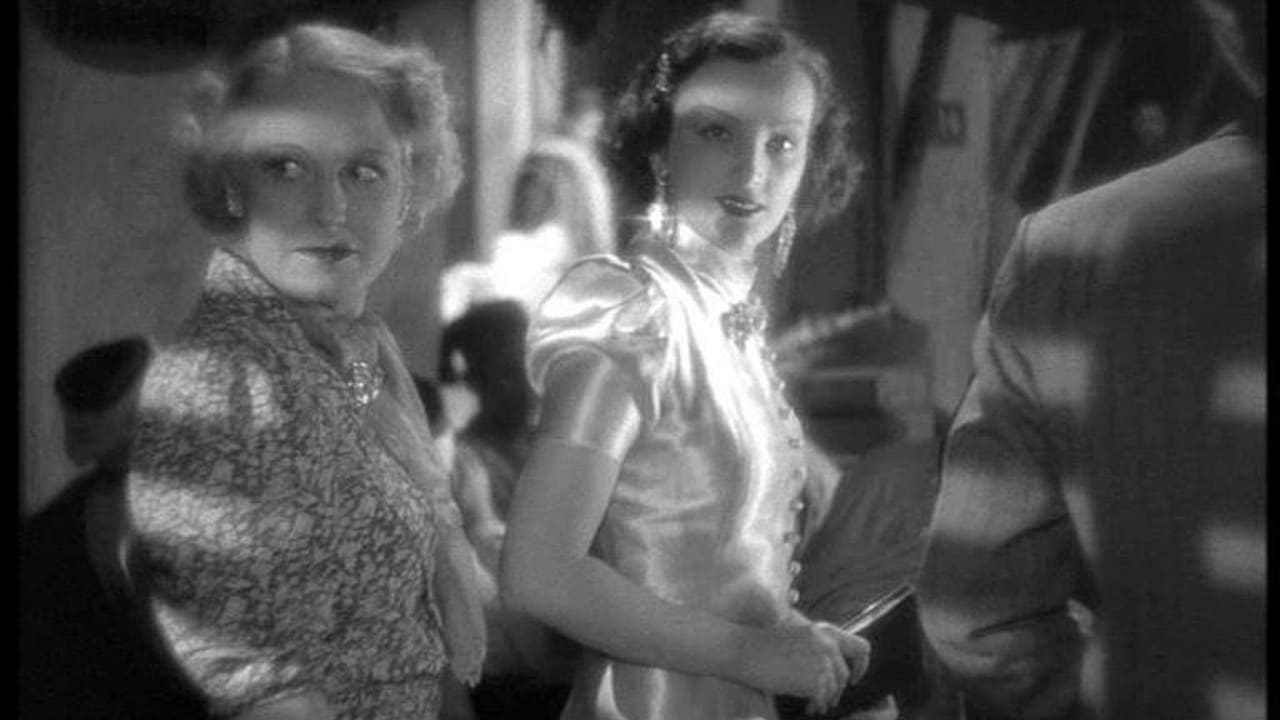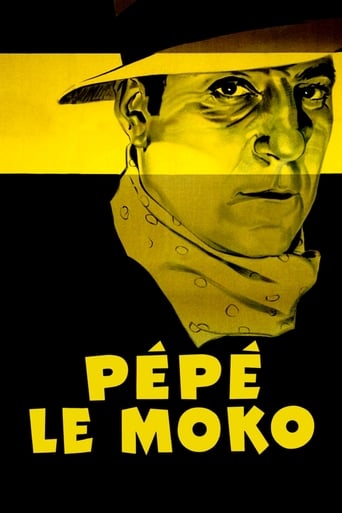

Let's be realistic.
... View MoreBest movie ever!
... View MoreI gave this film a 9 out of 10, because it was exactly what I expected it to be.
... View MoreAll of these films share one commonality, that being a kind of emotional center that humanizes a cast of monsters.
... View MoreThere is no doubt "Pepe le Moko" will feel familiar to you if you already saw "Casablanca", "Morocco", "Battle of Algiers" or plain "Algiers", the remake of 1938 starring Charles Boyer. But for me, it felt familiar on a deeper level; the introductory presentation of the Kasbah opened the dusty box of my childhood memories set in the Old Medina of Rabat where we came to visit the great-grandparents, so deep I can smell it. From my own experience, I could relate to the feeling of helplessness in these labyrinthine white streets, as a child losing the firm grip of an adult's hand.And this is why "Pepe Le Moko" is such a celebrated classic, because it has the star: Jean Gabin, the character but more importantly; the location. Pepe is a gangster who slips through the Metropolitan Police net to hide in the Algerian Kasbah like French Resistance members would soon hide in the scrub to escape from Nazis. And Julien Divivier's film was released two years shy away from World War II when French police would be accessories to the most shameful pages of French history. That this film makes us root for the 'gangster' figure instead of the pitiable policemen feels like a prophetic masterstroke and a stamp for modernity. It's like Henri Jeanson, the writer, had anticipated the moment where people would root for the outlaw rather than its enforcer.In fact, this sentiment is vividly present in French cinema of the 30's, carried by the wave of poetic realism, a genre that couldn't do without slightly romanticized figures rooted in the everyday world of the 'little people'. American 'realistic' cinema was incarnated by the Warner's gangster classics but their legacy was tarnished by the narrative interference of the Hays Code. Even in French movies, crime didn't pay, but the film trusted the audience's intelligence. Realism in America made the gangster an amoral thug, a coward or a loser killing his own men, in France, the outlaw was a bad person on a social level but with layers of goodness and honor beneath. The outlaw, as portrayed by Gabin, was the quintessential tragic figure, a man who couldn't face the present without ignoring the burden of the past. And the Kasbah was the perfect place for an exile.Indeed, people of the Kasbah all have a past to bury, there's a scene that doesn't add much to the film except to show that everyone in Algiers had left something behind, an old madam burst into tears when listening to an old song about Paris, a sort of "Where all the . Have gone?" It's hard to believe from our perspective that even in the thirties, people would be nostalgic, but nostalgia is the predominant theme in the film. Pepe is nostalgic of the Parisian streets he left, the metro stations, he's a sort of Rick Blaine who constantly reminisces about the old Paris. In fact, this is why Divivier's classic, almost 80 years now, still holds up very well today, because it embraced standards that would inspire classics, above them all: "Casablanca", and establishes staples of gangster or exotic romances: smoking and gambling crooks, corrupt cops, sneaky informants, overcrowded brothels, gold-hearted prostitutes, elegant mistresses and so on and so forth.It's a colorful gallery of characters but they aren't just archetypes, each of them is one of the many pieces of a game with the Kasbah as the chess board, as a character of its own; it gives the film its unique touch and is such an indispensable element, it inspires one of the greatest introductions from any film. When the policemen describe how tough it will be to find Pepe, it's worthy of a historical document, it has this value actually, establishing the Kasbah as a melting pot crowded with faces of all over the world, a succession of labyrinthine stairs and with the women dominating the terraces. The description reminds of Colonel Martin in "Battles of Algiers" explaining why it'll be tough to spot the terrorists, the Kasbah isn't just here to give the local flavor, it is a urbane jungle where we feel like home because we've seen "Casablanca".Yes, there's a sneaky fez-wearing cop double-dealing expert who speaks with the same hypocritically suave tone as Captain Renault, Pepe is a Blaine in terms of masculine aura and popularity, a virile tough guy who'd stick his neck out for nobody before discovering his soft spot for a classy mistress played by Mireille Balin and who's got nothing to envy from Ingrid Bergman. The thirties belonged to Gabin as only Gabin was capable to exude this manly charisma while being as gentle and tender as ever. This film is perhaps his most celebrated one at a time where he also played in Carné "Daybreaks" and Renoir's "Lower Depths". But in "Pepe Le Moko", he's in his most emblematic role in his pre-war period.And speaking of war, the film is also marked by its era through the beautiful face of Mireille Balin the Ilsa of the film, a distinguished woman, not the gypsy prostitute, that will steal Moko's heart. The actress would fall in a love with a German officer, be raped by Resistance members and then despite a few little come-back attempts, will be totally abandoned by French cinema and only one representative will assist her funeral in 1968, after she died of alcoholism, in such a miserable state she almost escaped common grave. This is a woman at the peak of her glory but would be the collateral damage of the ugliest side of French resistance: blind and violent expurgation.So, the film might be about people confronted to their past, but it carries many premonitions of the war-stricken future, it's a product of its time, of timeless appeal.
... View MoreEmploying dozens of shots and montages to bring to eye each of the words in a riveting description that describes the multi-ethnic demi-monde that is the "Casbah" (a sea-side teeming hill of French-Arab settlements) this film opens its eminently charming folds. A team of policemen, in another expertly filmed scene which follows the first one,, discuss the man they want to catch -Pepe Le Moko who's hiding out in the above-described warren. I watched this 1937 French film with the help of excellent English subtitles provided by the Criterion collection, and realized that even in the 1930s, the French could outclass Hollywood.Pepe (an effortlessly confident Jean Gabin), it quickly becomes clear, is an enigmatic criminal, wanted for a litany of transgressions. The camera when it first shows him tricks us into looking at someone lesser but we soon realize this is not the (anti)-hero. The lens eventually displays him holding a pearl in the oyster of his hand, clad fully in suit and tie, his light eyes flashing like the said gem. Pepe floats in a sea of relentlessly wonderful dialog both within and around, hounded by treachery, and drawn magnetically to shifting romance and serious complications. He never loses that sartorial armor of suit and tie- it's with him whether he is firing a gun,cradling a dying brother, holding a lady in his arms, or coolly snacking on a kebab off the streets.The picture is also a great example of why black and white cinematography is such a strongly atmospheric device - color would robbed this film's terrain of much of its uniqueness. Henri La Barthe's novel and Henri Jeanson's terrific dialogs help to fuel the drama, romance and intrigue surrounding the hero. He appears to be in early middle-age, has been hiding out in the Casbah for two years, is rapidly growing sick of its medieval confines ("I'm like England,my future is on the waves") and actively angles for new love ("home is wherever he finds a woman","when he is dead there will be three thousand widows at his funeral").Even under duress Pepe separates the wheat from the chaff and proceeds to hatch a really neat plan. His dialog from earlier in the story, regarding the ladies, then comes to mind - "I give them my body,but I keep my head". That is no doubt a good plan but it is not a perfect one. The heart is still in the body.For full review and other cinema analysis, you may visit http://www.upnworld.com/movie/view/id/12/title/Pepe+Le+Moko+
... View MoreYes, I know, a trite headline. Apart from the fact that I don't know much French, isn't it uncanny how many tales, fiction and non, have a woman at the heart of matters? So it is with Pepe Le Moko, another poor slob caught in a love affair which costs him dearly. And to think he was the toast of The Casbah, a local hero with all the money and women and friendship he could ask for.Director Duvuvier paints a vivid picture of the sprawling slum that is the Casbah, teeming with humanity and activity, a place that has become a prison - in an abstract sense - for Pepe. The movie sets a fast pace, with barely time to catch your breath as the tension builds towards a climax both anticipated and disheartening - as so often happens, we root for this appealing criminal, hoping the outcome will be different than we expect.Some have said that the film is a 'film noir' prototype, and I agree, even though the genre didn't start until a few years later. If we include it, it is one of the best - the website description of crime/drama/romance lends a mundane feel and doesn't do it justice.
... View MorePepe le Moko is a tragic figure -- his criminality has made him godfather of the Casbah but happiness eludes him because the instant he leaves he'll be nabbed by the cops.Powerful as he is, Pepe has no friend -- not the gypsy woman (well acted) who believes she loves him, nor the police inspector with whom he engages in homo-erotic repartee. Informers are snuffed out in the Casbah with impunity but they are in ever-replenishing supply.The ambiance of the Casbah is a character in itself here -- one of great allure and mystery. The bedazzling kept woman for whom Pepe lusts is less a love object than an irresistible reminder of the world he has lost.Jean Gabin's Pepe is a masterpiece of sexual appeal, savoir faire, and brilliance. Just when we think that love has befuddled him, we see that Pepe has outfoxed us again.He does manage to escape -- but how he does so ends this film on a shockingly unexpected yet triumphant note.
... View More